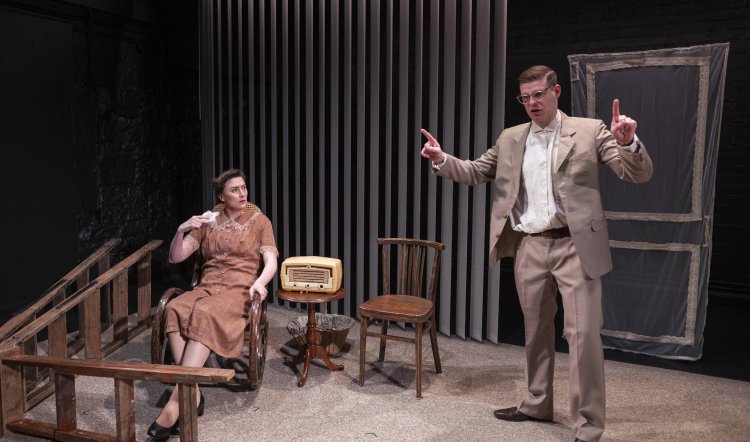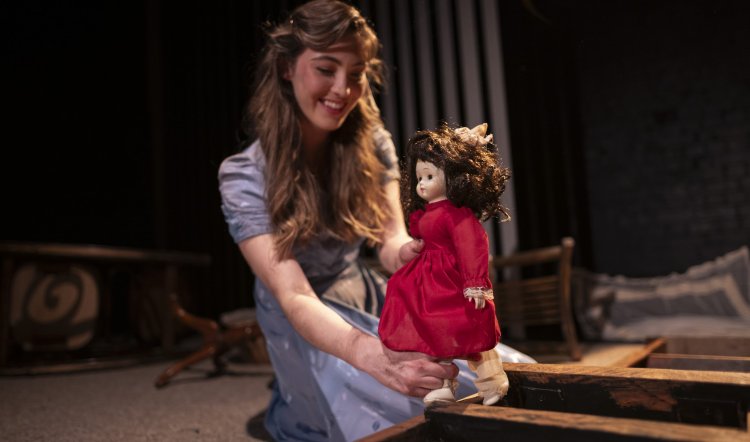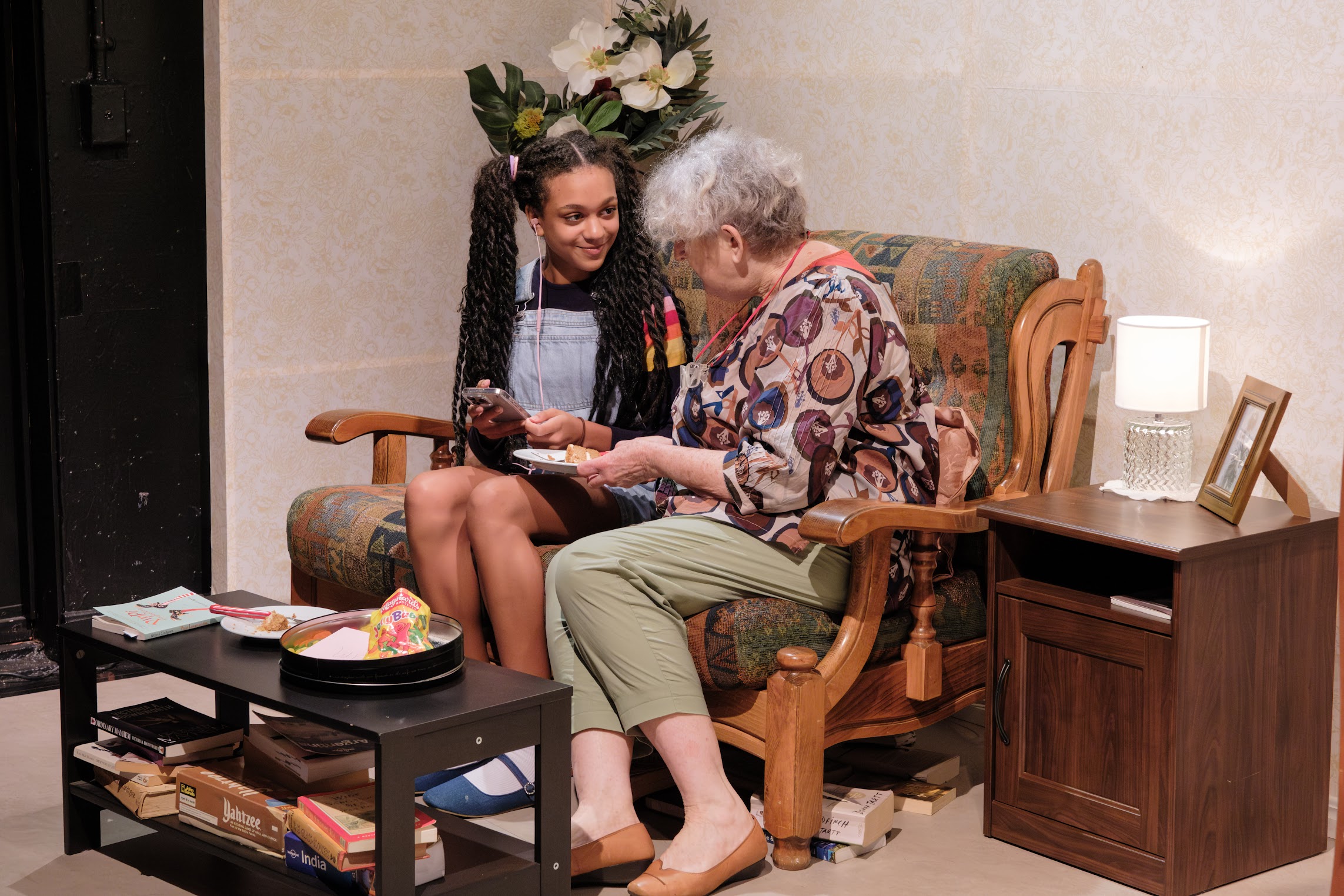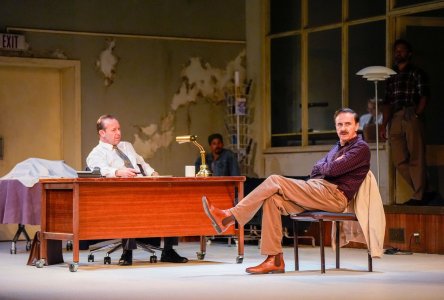
THREE (short) PLAYS
THREE PLAYS, Ground Floor Theatre Company at the Old Fitz, 5-15 August 2025. Photography by Robert Miniter
Tennessee Williams is renowned for his dramas, of which A Streetcar Named Desire, The Glass Menagerie, Cat On A Hot Tin Roof, and Suddenly Last Summer have all been seen recently in fine Sydney productions. Yet he was a prolific writer of short plays, and although more than 45 are listed, they are hardly ever staged. The three grouped for this short and sweet and sour late night at the Old Fitz are evidence that they’re well worth seeking out.
Beginning with At Liberty (1941), Gloria La Greene, an actress in her own mind rather than in reality (Helena Cielak), teeters home at two in the morning from a boozy date to be met by her mother (Emma Wright). It’s a remarkable confrontation between flighty despair and stony pragmatism as, packed into just 10 minutes of intense interplay, is the essence of 1947’s fully realised tragedy of Blanche DuBois and A Streetcar Named Desire.
Where Blanche plaintively declared that, “I have always depended on the kindness of strangers,” Gloria floats on a scrap of newsprint kept in her wallet: her one mention in Billboard magazine. No matter that it’s actually her own, self-funded advertisement for her talents, currently “at liberty”. Her mother is painfully aware of the truth, however, and also that Gloria is ill, and it’s encapsulated in an exchange culminating in the chilling observation, “The past keeps getting bigger at the future’s expense.”

In the second play, Auto-Da-Fe, also written in 1941, Wright reappears after a quick change covered by some beautifully nervy furniture fiddling by another iteration of unhappy offspring, Eloi (Will Manton). Wright is again a suffering Southern mother, this time catastrophically religious. Eloi works as a mail sorter and lives at home. His neat suit, careful hair, and elaborate shirt collar silently shriek sexual repression. (Meg Anderson is credited as Production Designer, and if she is also responsible for costumes, it’s a superb job that wouldn’t be out of place on a heavily-funded stage.)
Eloi inadvertently intercepts a photograph in an unsealed envelope. His contradictory response to it – repulsion and compulsion – reveals everything, while Wright’s fluttering alarm and trembly horror foreshadow the eventual outcome. In 15 minutes, we learn much about Williams’ lifelong preoccupation with his sad family and sadder difficulty with homosexuality. The writing and characterisations are sublime. And so is Emma Wright in what could easily be as overblown as yesterday’s magnolias, but is instead breathtakingly restrained and effective.
The final play might tickle movie buff memories as, in 1966, a much expanded version (written by Francis Ford Coppola), became a vehicle for Robert Redford and Natalie Wood. Nevertheless, it began as another 10-minute gem in 1946 titled This Property is Condemned. Set along a disused rural Mississippi railroad track (brilliant imagining from Meg Anderson: the wooden stepladders that were the front porch rails in Auto de Fe are repurposed as railway lines),

Willie (Helena Cielak) is a blithe 13-year-old who’s long abandoned polite society. She subsists alone in what was once her family’s now-abandoned boarding house of the title, and her favourite activity is a balancing game along the tracks. A local 16-year-old, Tom (Will Manton) is deviously keen to befriend her, probably not to play the balancing game.
Willie tells him about her elder sister Alva and her many gentlemen friends – railroad workers. Willie dreams of the same as a train inspector from New Orleans could be her ticket to somewhere – anywhere – else. Even as he sniffs around, Tom is cautious of the unpredictable child-woman, described thus by the playwright: “She is a remarkable apparition — thin as a beanpole and dressed in outrageous cast-off finery. She wears a long blue velvet party dress with a filthy cream lace collar and sparkling rhinestone beads. On her feet are battered silver kid slippers…She laughs frequently and wildly and with a sort of precocious, tragic abandon.”
Once again, it could be overblown, but the playwright, the actors, and director Megan Sampson fashion 10 captivating minutes of jewel-like humanity. Cielak and Manton become young teenagers with deceptive ease and credibility: they’re remarkable. So is the work of voice coach Laura Farrell – the beguilingly weird, sweetly syrupy tones of the Deep South could cause tooth decay. A more rewarding way to spend an hour would be hard to find. Hurry.



